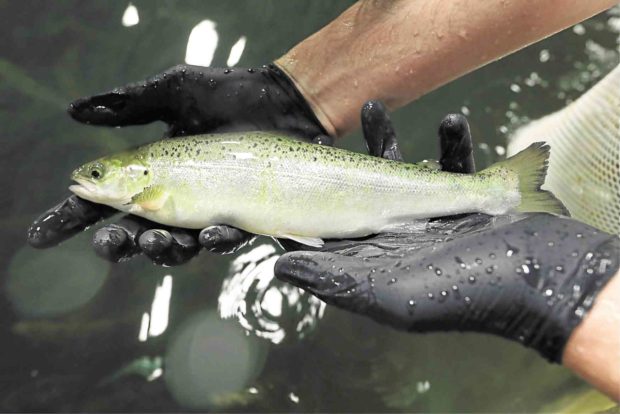Gene-edited salmon may soon hit menus

FROM LAB TO DINNER PLATE. An aquafarming complex in Indiana will be producing Atlantic salmon injected with the DNA of other fish species to make them grow about twice as fast as regular salmon. —AP
NEW YORK—Inside an Indiana aquafarming complex, thousands of salmon eggs genetically modified to grow faster than normal are hatching into tiny fish. After growing to roughly 4.5 kilograms (10 pounds) in indoor tanks, they could be served in restaurants by late next year.
The salmon produced by AquaBounty are the first genetically modified animals approved for human consumption in the United States. They represent one way companies are pushing to transform the plants and animals we eat, even as consumer advocacy groups call for greater caution.
AquaBounty hasn’t sold any fish in the United States yet, but it says its salmon may first turn up in places like restaurants or university cafeterias, which would decide whether to tell diners that the fish are genetically modified.
“It’s their customer, not ours,” said Sylvia Wulf, AquaBounty’s CEO.
More efficient
To produce its fish, Aquabounty injected Atlantic salmon with DNA from other fish species that make them grow to full size in about 18 months, which could be about twice as fast as regular salmon.
The company says that’s more efficient since less feed is required. The eggs were shipped to the United States from the company’s Canadian location last month after clearing final regulatory hurdles.
As AquaBounty worked through years of government approvals, several grocers, including Kroger and Whole Foods, responded to a campaign by consumer groups with a vow to not sell the fish.
Already, most corn and soy in the US is genetically modified to be more resistant to pests and herbicides. But as genetically modified salmon make their way to dinner plates, the pace of change to the food supply could accelerate.
Blurring lines
This month, President Donald Trump signed an executive order directing federal agencies to simplify regulations for genetically engineered plants and animals. The move comes as companies are turning to a newer gene-editing technology that makes it easier to tinker with plant and animal DNA.
That’s blurring the lines around what should be considered a genetically modified organism, and how such foods are perceived.
In 2015, an Associated Press-GfK poll found two-thirds of Americans supported labeling of genetically modified ingredients on food packages. The following year, Congress directed regulators to establish national standards for disclosing the presence of bioengineered foods.
Not subject to regulation
But foods made with the newer gene-editing technique wouldn’t necessarily be subject to the regulation, since companies say the resulting plants and animals could theoretically be produced with conventional breeding.
And while AquaBounty’s salmon was produced with an older technique, it may not always be obvious when people are buying the fish either. —AP